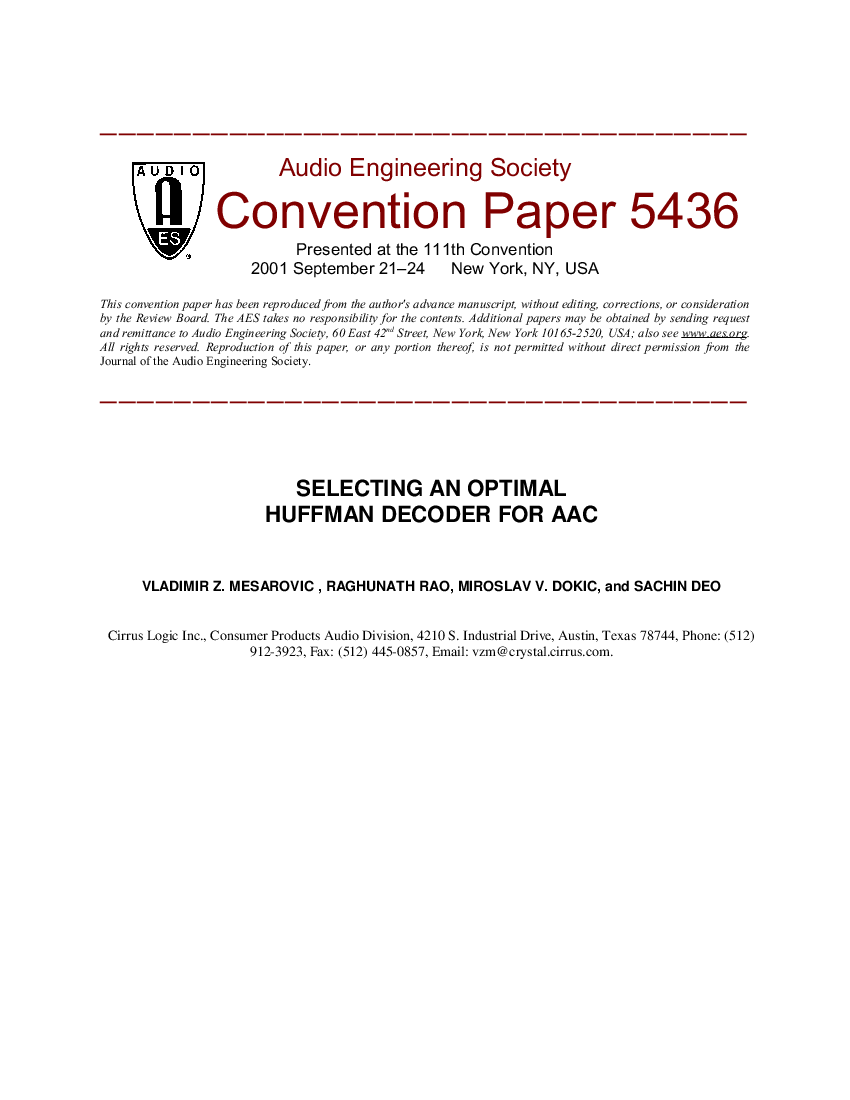Home / Publications / E-library page
You are currently logged in as an
Institutional Subscriber.
If you would like to logout,
please click on the button below.
Home / Publications / E-library page
Only AES members and Institutional Journal Subscribers can download
In today`s competitive consumer audio market the Advanced Audio Coding (AAC) format has quickly become a must-have technology with its adoption on the Internet, in digital radio, digital television and home theatre. Compression using AAC retains high audio quality even at low bit rates. One reason for this effectiveness is the use of Huffman variable length coding to represent frequency domain information. However, this requires to perform the relatively complex task of Huffman decoding in the audio decoder, which is typically very sensitive to cost and processor speed requirements. Furthermore, encoders can sometimes create worst-case scenarios consisting of very long code words, even when unnecessary. Thus, one needs to optimize the Huffman decoding for these worst-case scenarios without giving up average performance. This paper discusses various methods for Huffman decoding, their inherent implementation tradeoffs on a DSP platform and proposes improvements that are specific to the Huffman codebooks used in AAC.
Author (s): Mesarovic, Vladimir Z.; Rao, Raghunath; Dokic, Miroslav V.; Deo, Sachin
Affiliation:
Cirrus Logic Inc., Consumer Products Audio Division, Industrial Drive, Austin, TX
(See document for exact affiliation information.)
AES Convention: 111
Paper Number:5436
Publication Date:
2001-11-06
Import into BibTeX
Session subject:
Signal Processing; Coding of Audio Signals
Permalink: https://aes2.org/publications/elibrary-page/?id=9828
(439KB)
Click to purchase paper as a non-member or login as an AES member. If your company or school subscribes to the E-Library then switch to the institutional version. If you are not an AES member Join the AES. If you need to check your member status, login to the Member Portal.

Mesarovic, Vladimir Z.; Rao, Raghunath; Dokic, Miroslav V.; Deo, Sachin; 2001; Selecting an Optimal Huffman Decoder for AAC [PDF]; Cirrus Logic Inc., Consumer Products Audio Division, Industrial Drive, Austin, TX; Paper 5436; Available from: https://aes2.org/publications/elibrary-page/?id=9828
Mesarovic, Vladimir Z.; Rao, Raghunath; Dokic, Miroslav V.; Deo, Sachin; Selecting an Optimal Huffman Decoder for AAC [PDF]; Cirrus Logic Inc., Consumer Products Audio Division, Industrial Drive, Austin, TX; Paper 5436; 2001 Available: https://aes2.org/publications/elibrary-page/?id=9828